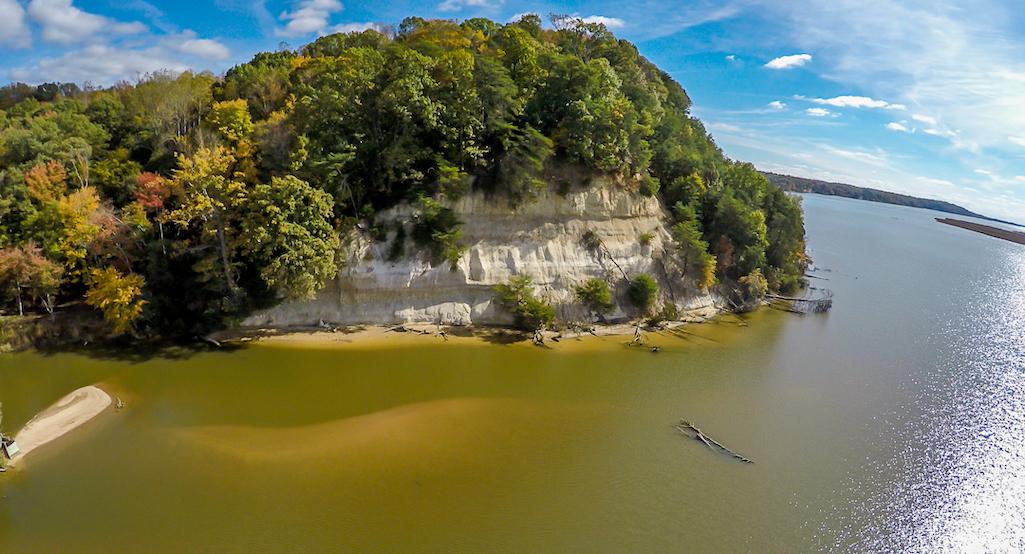
A stretch of Fones Cliffs in Virginia above the Rappahannock River has been regained by the Rappahannock Tribe. The cliffs in this photo were not part of the reaquisition and still need to be protected from development/Chesapeake Conservancy, Jeffrey Allenby
Four-hundred-and-sixty-five acres along a four-mile stretch of sandstone bluffs on the north bank of the Rappahannock River in Virginia, a place where Captain John Smith first encountered the Rappahannock Tribe in 1608, has been regained by the tribe.
The site, known as Fones Cliffs, long has been sacred to the tribe. Prior to contact with the English, the Rappahannock Tribe lived in at least three villages on the Cliffs––Wecuppom, Matchopick, and Pissacoack. Fones Cliffs is located within the authorized boundary of the Rappahannock River Valley National Wildlife Refuge. The land will be owned by the Rappahannock Tribe and be publicly accessible and held with a permanent conservation easement conveyed to the Service.
The Rappahannock River below the cliffs is part of the Captain John Smith Chesapeake National Historic Trail. Smith's journals describe three American Indian settlements above the cliffs and a skirmish with a few dozen Rappahannock warriors.
“We have worked for many years to restore this sacred place to the tribe. With eagles being prayer messengers, this area where they gather has always been a place of natural, cultural and spiritual importance,” said Rappahannock Tribe Chief Anne Richardson.
“The [Interior] Department is honored to join the Rappahannock Tribe in co-stewardship of this portion of their ancestral homeland. We look forward to drawing upon tribal expertise and Indigenous knowledge in helping manage the area’s wildlife and habitat,” said Interior Secretary Deb Haaland on Friday during a ceremony to celebrate the deal. “This historic reacquisition underscores how tribes, private landowners and other stakeholders all play a central role in this administration’s work to ensure our conservation efforts are locally led and support communities’ health and well-being.”
The Rappahannock Tribe will preserve the land and the wildlife that flourish there including migratory birds and waterfowl. Fones Cliffs is home to bald eagle nests and has been designated by the National Audubon Society as an Important Bird Area with global significance. Eagles are sacred to the tribe.
The land will be publicly accessible and held with a permanent conservation easement conveyed to the U.S. Fish and Wildlife Service. Chesapeake Conservancy donated the easement to the USFWS, then donated the fee title to the Rappahannock Tribe, which intends to place the land in Trust with the Bureau of Indian Affairs. The Tribe plans trails and a replica 16th-century village, where tribal citizens can educate the public about their history and Indigenous approaches to conservation and connect future generations of Rappahannock youth to their tribal traditions and the river which bears their name.
“Relationships, knowledge-sharing and co-stewardship with Indigenous peoples are essential to the Service’s mission,” said U.S. Fish and Wildlife Service Director Martha Williams. “We have the direction and tools to ensure collaboration between the Service and tribes, and to protect cultural, trust and treaty resources on Service lands, in support of our shared priority of conserving fish, wildlife and their habitats.”
“Through the generosity of the family of William Dodge Angle, M.D., Chesapeake Conservancy is honored to facilitate the return of Fones Cliffs to the Tribe, and to partner with them to bring Indigenous-led conservation practices back to the Rappahannock River,” said Chesapeake Conservancy President and CEO Joel Dunn. “This is a significant step forward in the overall goal to save approximately 2,000 acres at Fones Cliffs, a haven for wildlife and waterfowl and one of the most beautiful places in the Chesapeake and in fact, the world.”
The donation restores an iconic site to the tribe, which was forcibly removed from the Cliffs after 1649 as English settlers took over valuable farmland.
“Warmest congratulations to the Rappahannock Tribe on the successful conclusion of a long journey to reacquire their ancestral lands at Fones Cliffs,” said U.S. Senator Tim Kaine, who introduced and successfully passed legislation in 2018 to recognize six Virginia Tribes, including the Rappahannock. “I am deeply grateful to all who helped with this effort, including Chief Anne Richardson, the Chesapeake Conservancy, and Secretary Haaland and look forward to continuing to work together to ensure that the federal government respects the sovereignty and self-determination of Virginia Tribes. We have a lot of work ahead to undo many wrongs inflicted on tribal communities, but milestones like this one are a powerful reminder that meaningful steps are possible and necessary.”
Additional funding for the Rappahannock Tribe to conserve 465 acres of Indigenous ancestral homelands on the Rappahannock River was made possible by a grant from the National Fish and Wildlife Foundation through Walmart’s Acres for America Program.
The land offers opportunities for the tribe to expand its Return to the River program, which trains tribal youth in traditional river knowledge and practices and conducts outreach and education for other communities interested in the Rappahannock River. In 2017, through the generosity of Ms. Virginia Warner, Chesapeake Conservancy facilitated the donation of a single acre of land near Fones Cliffs, which the tribe uses as a staging area for the program.
The Rappahannock Tribe is a federally recognized sovereign nation headquartered at Indian Neck in King & Queen County, Virginia. The areas surrounding the Rappahannock River are the ancestral homelands of the tribe, and the tribe continues to live, visit and conduct traditional cultural practices along the river. Native fish, bird and plant species along the river are of cultural significance to the tribe.



Add comment